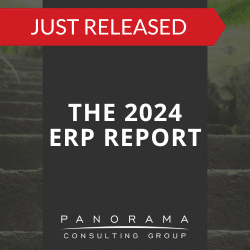You began your ERP project with great expectations, but it derailed somewhere and now you’ve incurred extra costs, lost productivity and a frustrated workforce. Throughout this ERP implementation failure, who is to blame?
While it’s tempting to immediately accuse your ERP vendor, ERP consultant or systems integrator, it’s important to take a closer look at the situation. There’s a chance that your project team may shoulder some of the responsibility.
6 Ways Organizations Can Seal Their Own ERP Failure Destiny
1. Not Ensuring Executive Buy-in
Pushing forward with an ERP implementation before your C-suite is on board is a recipe for disaster.
A successful ERP implementation hinges on an active and involved team of executives that is willing to support your cause with money, resources and communication. Without this support, your project can fizzle out before it’s complete.
Any business transformation carries an understood amount of risk, but these risks are amplified when executives are misaligned regarding project goals and what is necessary to achieve them.
2. Building an Inadequate Project Team
Is your ERP project team comprised of individuals who can handle the tactical responsibilities of the ERP project? Many organizations staff their project teams with employees who are unable or unwilling to communicate change to their individual departments, spearhead training efforts or participate in business process reengineering.
Even if your project team is large enough, it may not incorporate the right individuals. Staffing your project team with inexperienced people can result in communication siloes, productivity lags and crossed wires that eventually lead to project failure.
Contemplating litigation?
We are called upon to investigate the feasibility of litigation, provide software expert witness testimony and build background reporting for some of the industry’s highest-profile ERP lawsuits.
3. Automating Inefficiencies
When you fail to improve your processes before selecting an ERP system, you risk automating inefficiencies. How can you tell if you’ve adequately focused on process improvement? If your ERP implementation is resulting in lower than expected benefits realization, this is one sign that your processes needed more attention.
Automating an inefficient process does not always make it more efficient. ERP software cannot magically fix inefficiencies like duplication of work or convoluted approval processes. These processes should be improved before ERP selection so you can determine if your ERP vendor can support these optimized processes in a way that makes sense for your organization.
When an ERP solution cannot meet your business requirements, you may want to blame the vendor, but often, the cause is inadequate process improvement and ERP requirements gathering.
4. Treating the Project Like a Technology Project
At the end of the day, your ERP implementation is more of a business project than a technology project. However, many companies dedicate so much focus to the technical aspects of the project that they neglect the people and process aspects.
As a result, the project fails to achieve measurable business benefits. (Replacing an outdated system with a modern one while staying on time and on budget is not a business benefit.)
A real business benefit is something like, “Reduced customer service wait times by x minutes.” This is an ERP business benefit that aligns with broader organizational goals, like improving the customer experience.
Achieving these business-related goals requires a focus on business processes and human capital. After all, your employees are the ones performing the processes that create business value, so if they’re ill-equipped to effectively use the new ERP software solution, you can expect fewer business benefits.
In fact, we have found that companies that neglect organizational change management are more likely to experience ERP implementation failure.

5. Having Unrealistic Time and Cost Expectations
The costs associated with an ERP project can be difficult to estimate. There are many activities organizations don’t consider upfront, and these unrealistic expectations can lead to unexpected costs and budget overruns.
While your vendor or systems integrator may be able to accurately estimate the technical implementation costs, they don’t always account for the cost of success factors, like customized training and targeted communication. It’s your responsibility to do your due diligence and determine if the vendor’s cost estimates are accurate before you sign off on it.
6. Allowing Too Much Software Customization
Today, ERP software has robust out-of-the-box functionality, but you may still need some amount of customization to fit certain business processes related to your competitive advantage.
While there’s nothing wrong with minimal customization, it can be a slippery slope. Employees may continue to make customization requests to make a process more familiar and easier to learn.
Without a project governance structure to determine which of these requests add real business value, your project may end up over budget and ultimately result in ERP failure.
In an ERP Implementation Failure, who is to Blame?
There will be times when a software vendor makes a decision or recommendation that leads an ERP project off-course, but ultimately, are they to blame? The six factors above reveal that the culprits could be closer than you think.
Our ERP expert witness team can help you assess your project to determine if you really have to file an ERP lawsuit. Request a free consultation below to learn more.














